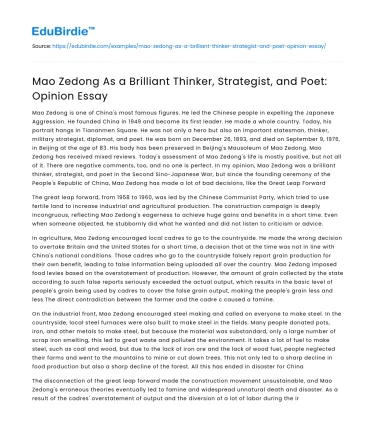Mao Zedong is one of China's most famous figures. He led the Chinese people in expelling the Japanese Aggression. He founded China in 1949 and became its first leader. He made a whole country. Today, his portrait hangs in Tiananmen Square. He was not only a hero but also an important statesman, thinker, military strategist, diplomat, and poet. He was born on December 26, 1893, and died on September 9, 1976, in Beijing at the age of 83. His body has been preserved in Beijing's Mausoleum of Mao Zedong. Mao Zedong has received mixed reviews. Today's assessment of Mao Zedong's life is mostly positive, but not all of it. There are negative comments, too, and no one is perfect. In my opinion, Mao Zedong was a brilliant thinker, strategist, and poet in the Second Sino-Japanese War, but since the founding ceremony of the People's Republic of China, Mao Zedong has made a lot of bad decisions, like the Great Leap Forward
The great leap forward, from 1958 to 1960, was led by the Chinese Communist Party, which tried to use fertile land to increase industrial and agricultural production. The construction campaign is deeply incongruous, reflecting Mao Zedong's eagerness to achieve huge gains and benefits in a short time. Even when someone objected, he stubbornly did what he wanted and did not listen to criticism or advice.
Save your time!
We can take care of your essay
- Proper editing and formatting
- Free revision, title page, and bibliography
- Flexible prices and money-back guarantee
In agriculture, Mao Zedong encouraged local cadres to go to the countryside. He made the wrong decision to overtake Britain and the United States for a short time, a decision that at the time was not in line with China's national conditions. Those cadres who go to the countryside falsely report grain production for their own benefit, leading to false information being uploaded all over the country. Mao Zedong imposed food levies based on the overstatement of production. However, the amount of grain collected by the state according to such false reports seriously exceeded the actual output, which results in the basic level of people's grain being used by cadres to cover the false grain output, making the people's grain less and less The direct contradiction between the farmer and the cadre c caused a famine.
On the industrial front, Mao Zedong encouraged steel making and called on everyone to make steel. In the countryside, local steel furnaces were also built to make steel in the fields. Many people donated pots, iron, and other metals to make steel, but because the material was substandard, only a large number of scrap iron smelting, this led to great waste and polluted the environment. It takes a lot of fuel to make steel, such as coal and wood, but due to the lack of iron ore and the lack of wood fuel, people neglected their farms and went to the mountains to mine or cut down trees. This not only led to a sharp decline in food production but also a sharp decline of the forest. All this has ended in disaster for China
The disconnection of the great leap forward made the construction movement unsustainable, and Mao Zedong's erroneous theories eventually led to famine and widespread unnatural death and disaster. As a result of the cadres' overstatement of output and the diversion of a lot of labor during the iron-making process, large areas of crops were not harvested and large areas of land were left uncultivated. Large public canteens also wasted a large amount of food. From winter 1958 to spring 1959, Some regions began to suffer from hunger, because the Rightists were fond of exaggerating, they did things that were not true, they inflated grain production, and leading cadres everywhere were afraid of being labeled as Rightists. They kept the secret, and the Central Committee continued to praise the People's commune. But food shortages affected even Zhong Nan Hai that year, several heads of the state live in Zhong Nan Hai, including Mao Zedong. At the local level, many families were looted and forced to collect food in order to purchase food on the basis of unrealistic data. To make up for the huge data gap, farmers' grain rations were collected. However, the huge gap created by the screening cannot be bridged, as part of the People's commune has used natural disasters as an excuse to reduce the amount of high-yielding food to save some rations and reduce losses. But the nationwide food shortage was irreversible.






 Stuck on your essay?
Stuck on your essay?

